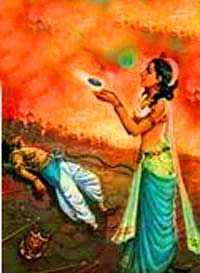The Role of Lesser-known Women in Mahabharata
- DHRUVI GOHIL
- May 21, 2023
- 3 min read
The Mahabharata is an ancient epic that holds very important religious and cultural significance. It is composed in the language Sanskrit and is also one of the longest poems ever written. It narrates the story of the Kuru dynasty and is centered around the war between the Pandavas and the Kauravas. The epic is based on themes such as duty, consequences of our actions, morality, and knowing the difference between right and wrong.
Photo credit-in.pinterest.com
The role of women in the story is multi-faced and immensely diverse. The women reflect upon the values and courage they held during the ancient time. Here are a few lesser-known women of the Mahabharata who have played an immense role-
1. Ulupi- Ulupi is the daughter of King Kauravya who is a Naga(serpent) king. She belongs to the Serpent race called Naga. She can survive underwater and has a close network with the marine world. During the exile of the Pandavas and their stay in the kingdom of Manipura which was ruled by King Chitravahana, Ulupi falls in love with Arjuna. Ulupi is a very assertive woman and so she reciprocates her feelings to Arjuna and then they marry each other. Ulupi brings Arjuna back to life by using the Nagamani (gem) after Babruvahana (son of Chitrangada and Arjuna) killed Arjun.
Photo credit-www.hindu-blog.com
She provides Arjuna with strong weapons which he uses during the Kurukshetra war. Their son Iravan also helps the Pandavas during the war and sacrifices his life on the battlefield. Ulupi's character challenges societal stereotypes and laws. She breaks the boundaries by falling in love with Arjuna and marrying him. This showcases the power of women to break the norms for good and the strength of love.
2. Hidimbi (Hidimba)- Hidimbi is a rakshasi (demoness) and the sister of Hidimba, another demon. The Pandavas encounter her during their exile in the forest. Hidimbi gets attracted to Bhima (one of the Pandavas) and expresses her desire to marry him. Bhima agrees to marry her and fights with his brother ultimately defeating him. They marry and Hidimbi gives birth to their son Ghatotkacha. He grows and becomes a strong warrior and plays a significant role in the Kurukshetra war by supporting the Pandavas.
Photo credit-devdutt.com
Hidimbi's character demonstrates her dedication and love toward Bhima. She is seen to be loyal and protective and shows control of her demon nature up to some extent. She breaks the societal norms of being a demon and contributes to Pandava's journey and the war.
3. Sudheshna- Sudeshna was the queen of the kingdom Matsya and the wife of King Virata. She welcomes the Pandavas to stay in their kingdom during the exile unaware of their true identity. She sheltered them and protected them. Sudehsna was very fond of Draupadi who was disguised as Sairandhri. She took Draupadi to work in her personal chambers and admired her.
Photo credit-en.wikipedia.org
Sudeshna's role in this epic depicts her respect toward all classes of people and her wisdom and loyalty toward her guests. She is the symbol of benevolence and strength as the Queen of Matsya.
4. Shikandini- Shikhandini is a unique role in the epic. She is initially born as a female named Amba who is abducted by Bhishma, the Kuru prince. She seeks revenge against Bhishma for ruining her life and takes a vow of killing him. By the blessings of god, she is reborn in a male body as Shikhandini and is a powerful warrior. Shikhandini's presence on the battlefield leads to Bhishma stepping down as the commander-in-chief as he is bound by the vow to never fight a female.
Photo credit-peepalinspires.com
Shikhandini's journey showcases her challenge toward societal norms and expectations. She defies the traditional gender roles to seek justice for the injustice she suffered as Amba. It also highlighted the complexities of human existence and the consequences of one's actions. It also reminds us of the fluidity of identity and the importance of standing up against injustice.
The women reflect upon themes such as courage and resilience, moral compassion and wisdom, marital roles, symbolism, and allegory. The lesser-known female characters of Mahabharata may not have as significant role as the other main characters such as Draupadi and Kunti, but they still play a remarkable position in the epic. These women add up to the overall narrative and give us important insights into the role of women during that time.









Comments